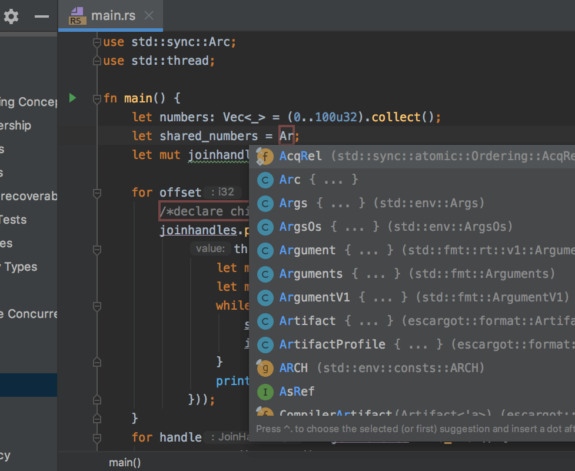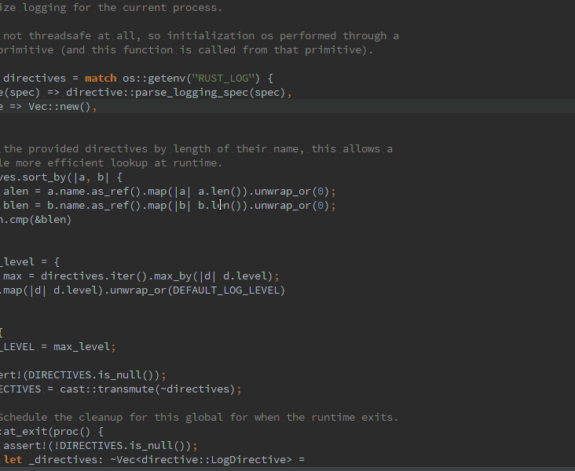Rust Programming Language For PC Download
Rust is a memory-efficient programming language that can power performance-critical services, run on embedded computers, and easily combine with other languages.
This programming language is constantly evolving, with the aim of providing users with a stable way to create client/server applications that operate on the Internet.
 The language uses curl-braces and blocks expressions in order to function, featuring a self-hosted compiler, rustc.exe, which uses Low-Level Virtual Machine, or LLVM, as a backend.
The language uses curl-braces and blocks expressions in order to function, featuring a self-hosted compiler, rustc.exe, which uses Low-Level Virtual Machine, or LLVM, as a backend.
Running the shell will reveal a large proportion of its features and options, explaining their functioning in brief for programmers to understand and figure out how to use.
Rust’s rich type system and ownership model guarantee memory safety and thread-safety — and enable you to eliminate many classes of bugs at compile-time.
It has great documentation, a friendly compiler with useful error messages, and top-notch tooling — an integrated package manager and build tool, smart multi-editor support with auto-completion and type inspections, an auto-formatter, and more.
In 2018, the community decided to improve the programming experience for a few distinct domains (see the 2018 roadmap). For these, you can find many high-quality crates and some awesome guides on how to get started.
System Requirements
| Operating System | Windows 7, 8, 10 |
Rust Programming Language For PC Software Features
- Command Line: Whip up a CLI tool quickly with Rust’s robust ecosystem. It helps you maintain your app with confidence and distribute it with ease.
- WebAssembly: Use Rust to supercharge your JavaScript, one module at a time. Publish to npm, bundled with webpack, and you’re off to the races.
- Networking: Predictable performance. Tiny resource footprint. Rock-solid reliability. Rust is great for network services.
- Embedded: Targeting low-resource devices? Need low-level control without giving up high-level conveniences? It has you covered.
Screenshots of Rust Programming Language For Windows
Rust Programming Language Gallery
Official Video of Rust Programming Language 2021 Software
Rust Language For PC FAQs
Why curly brackets? Why Can't Rust's Syntax Be Loke Haskell's or Python's?
The use of curly brackets to denote blocks is a common design choice in a variety of programming languages, and Rust’s consistency is useful for people already familiar with the style. The curly brackets also allow for more flexible syntax for the programmer and a simpler parser in the compiler.
ad
Can I Use Unstable Features On The Beta Or Stable Channel?
No, you cannot. Rust works hard to provide strong guarantees about the stability of the features provided on the beta and stable channels. When something is unstable, it means that we can’t provide those guarantees for it yet, and don’t want people relying on it staying the same. This gives us the opportunity to try changes in the wild on the nightly release channel, while still maintaining strong guarantees for people seeking stability.
ad
How Fast Is Rust?
Fast! This is already competitive with idiomatic C and C++ in a number of benchmarks (like the Benchmarks Game and others).
Like C++, Rust takes zero-cost abstractions as one of its core principles: none of Rust’s abstractions impose a global performance penalty, nor is there overhead from any runtime system in the traditional sense.
ad
Is Rust Garbage Collected?
No. One of Rust’s key innovations is guaranteeing memory safety (no segfaults) without requiring garbage collection.
By avoiding GC, Rust can offer numerous benefits: predictable cleanup of resources, the lower overhead for memory management, and essentially no runtime system. All of these traits make Rust lean and easy to embed into arbitrary contexts and make it much easier to integrate Rust code with languages that have a GC.
ad
Rust Language For PC Older Versions
| Version Name | Date | Size | Download |
| 1.52.1 | 7.7 MB | Download |
- C++
- Java
- Ruby
- Python
What’s new in this version:
Rust 1.52.1
– Change log not available for this version
Rust 1.52.0
Language:
– Added the unsafe_op_in_unsafe_fn lint, which checks whether the unsafe code in an unsafe fn is wrapped in a unsafe block. This lint is allowed by default, and may become a warning or hard error in a future edition.
– You can now cast mutable references to arrays to a pointer of the same type as the element
Compiler:
– Upgraded the default LLVM to LLVM 12
Added tier 3* support for the following targets:
– s390x-unknown-linux-musl
– riscv32gc-unknown-linux-musl & riscv64gc-unknown-linux-musl
– powerpc-unknown-openbsd
– Refer to Rust’s platform support page for more information on Rust’s tiered platform support
Libraries:
– OsString now implements Extend and FromIterator
– cmp::Reverse now has #[repr(transparent)] representation
– Arc now implements error::Error
– All integer division and remainder operations are now const
Stabilised APIs:
– Arguments::as_str
– char::MAX
– char::REPLACEMENT_CHARACTER
– char::UNICODE_VERSION
– char::decode_utf16
– char::from_digit
– char::from_u32_unchecked
– char::from_u32
– slice::partition_point
– str::rsplit_once
– str::split_once
– The following previously stable APIs are now const.:
– char::len_utf8
– char::len_utf16
– char::to_ascii_uppercase
– char::to_ascii_lowercase
– char::eq_ignore_ascii_case
– u8::to_ascii_uppercase
– u8::to_ascii_lowercase
– u8::eq_ignore_ascii_case
Rust Programming Language Overview
Rust Programming Language Technical Specification

| Version | 1.52.1 |
| File Size | 7.7 MB |
| Languages | English |
| License | Open Source |
| Developer | Mozilla Organization |
Conclusion
Rust employs higher-order functions, as well as pattern matching through enums, as well as type-parametric functions, type classes – which allow for polymorphism – and the Object-Oriented Style GUI.
It requires a strong programming experience since it is not the most user-friendly of languages, but it provides users with detailed documentation, implying that motivated individuals would not have a tough time understanding at least the fundamentals of interacting with it.
ad




Comments are closed.